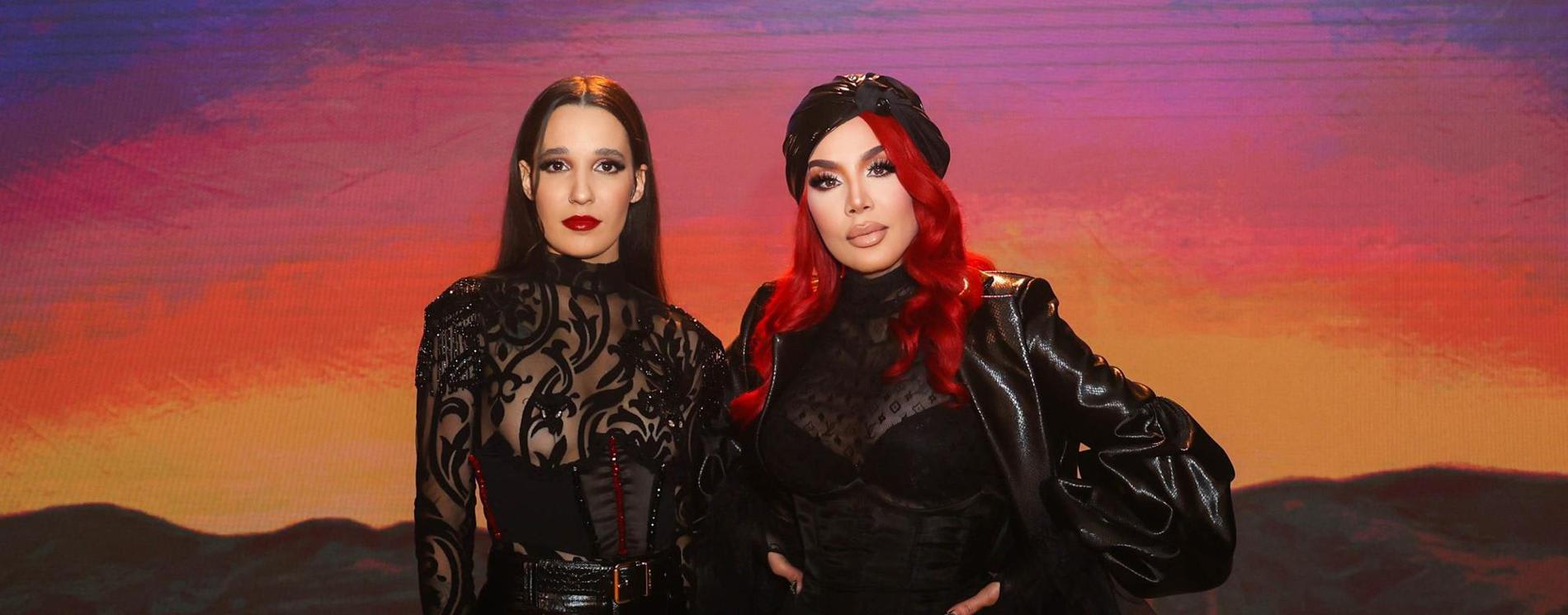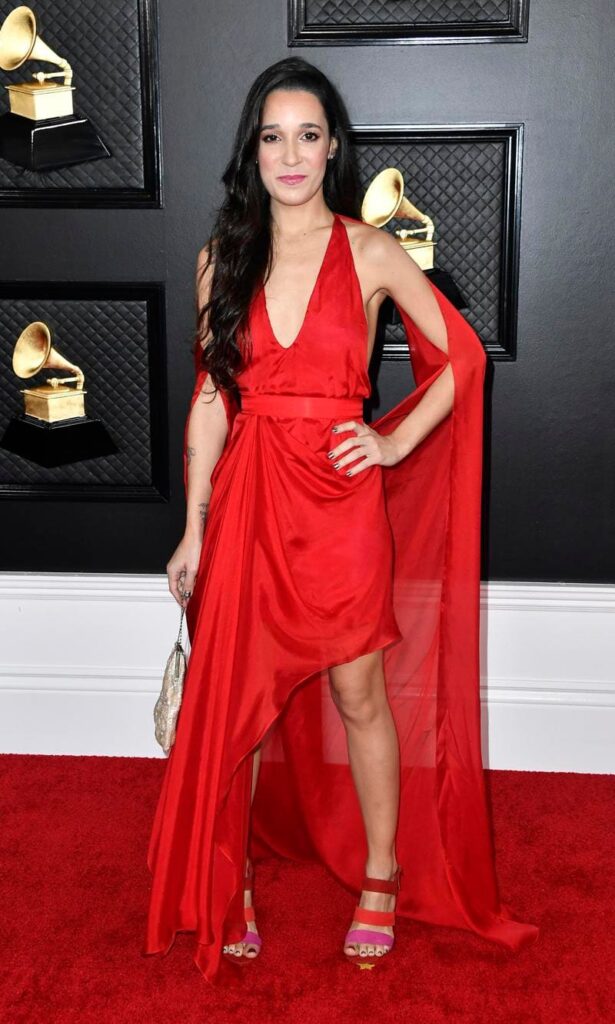iLe has a singular voice and message. She’s a performer that occupies various genres, spaces and concepts, someone that resists categorization. Her new record “Nacarile” was a critical hit, ranked as one of the best records of 2022 in prestigious year end lists like “The New York Times.” It has collaborations with artists of varying backgrounds, from Natalia LaFourcade to Ivy Queen, with the songs comfortably inhabiting the same space, united by a lyrical thread that’s honest and geniuine.
Born and raised in Puerto Rico, Ileana Cabra kicked off her career in the Grammy-winning band Calle 13, alongside her siblings Rene and Eduardo. Now as a solo artist, iLe’s songs explore thorny topics like love, heartbreak, and femininity, all with an equal degree of passion, curiosity and intelligence. Her music feels unique. After going through her discography, you realize that her sound has few counterparts; it belongs only to her.
In an exclusive interview with HOLA! USA, iLe discussed her U.S. tour, which kicked off this past March 3, and her excitement over getting to create music all over again, with every night becoming an opportunity to start anew.
First of all, I wanted to talk a little bit about your US tour. What is the most exciting part about performing “Nacarile” live?
I think that it has been exciting to feel that I am getting to know the album differently while in rehearsals and everything, because it becomes a new fun way to play around with it and find different sounds. When you’re performing with the band you try to find something close to what the album sounds like but you don’t want to do the exact same thing all over again because it’s already there, in the record. So you try to layer it with other sounds, and that’s fun. I’m glad that we had a time to rehearse and process the album, and also connecting the songs from the previous albums with this the songs from this one. I’m excited that everything feels complete now, playing the three albums together live. I feel like it’s going to be a nice and enjoyable performance.
You have this varied and extensive musical career. What feels different about “Nacarile”?
I think it has to do with the process of making the record. It was different from the others because it was hard for me to work it out. It was made during the quarantine and the pandemic, and all those years that were so confusing. It was very overwhelming for me to create this album and for it to be as focused as I wanted it to be. I felt like I had to deal with being out of focus and to find a way to keep going, and continue to make the album. And at the end, it felt great, that even though I was a little bit scared that everything I had worked on didn’t make any sense at all (laughs) I felt like I understood everything that was going on throughout that time, and I felt that I understood myself as well. Making this record made me deal with things that are tough to deal with, and made me feel uncomfortable. So I learned something new about myself. Everytime that I create an album, I try to respect and enjoy the process as much as I can. That includes those moments in the process that are tougher and more complex. I feel like I’m ready for more now, but I needed this. I needed this moment to deal with things of my own with this album.
The music video for “Algo Bonito” just came out. This song is like a mix of contradictions for me. Can you share some of the thought process behind its making?
I think while I was writing the song I was feeling this frustration and rage that happens every time that we are diminished as a feminist movement, every time that the message we try to send is minimized. Still, I didn’t want the song to have that frustrated energy. I wanted to find the courage that comes after that, the energy to do something about it.
I think it’s important not to let frustration stop us from sending the message we want to send. The song is a little bit about that. I like that it’s a protest song, in a way, but there’s also an element of satire of what the patriarchy and the stigmas that it’s put in women, that we’re tired of listening to. Also the chorus is a way of trying to redefine what “Algo Bonito” is to us as women. What is somethin beautiful for us? It’s not stereotypes; it’s not roses; it’s not what everyone says it is. It’s more than that. It’s our rights, it’s our freedom and our place here in the world, one that is still not totally defined.
Yeah. It’s a like a feminist reggaeton anthem, which feels very unique to me because reggaeton is such a complicated genre for women. Do you think feminism can be strengthened when used in the context of that genre?
I don’t know (laughs). I mean, I wasn’t thinking about reggaeton at all. It started more as a march. And I think it beecame something else when I started adding a little suggestion here, a little suggestion there. And also having Ivy involved. Maybe I wanted her to feel comfortable as well, but I wasn’t thinking like ‘Ah, I want this to be like a reggaeton song.’ I never think in genres when I’m working on a song. I don’t want to pressure myself or the song with that.
I think with what is happening today with reggaeton, a genre that’s so popular, I try to find ways to make a very complex and very dense topic into something digestible. And because there are so many things that I want to say and want to express, I don’t want them to be boring. I don’t want to put too much weight on people, you know? I want the music to feel healing at the same time and liberating, and maybe even motivational.
That’s how I see it with music and in art. it’s my little tool to try to understand what happens in life and emotionally, socially, psychologically. That’s how I like to work with my songs. Maybe nowadays it might be easier with reggaeton, but I don’t feel… I don’t feel like that’s my way, so I try to play around with it. And maybe for me, it is the most important thing. It’s also how, how the lyrics and then the musicality is expressed that maybe it feels a little easier to receive it.

I also wanted to ask about your partnership with Ivy Queen. How did that come about?
It was actually my brother Gabriel. He suggested it and was like ‘Why don’t you do something with Ivy?“ I was already working on this song. It was a little different but the musicality and where it was going was similar. And then I obviously wanted it to happen, but I always think… I prefer to prepare myself for things not happening than for when they happen (laughs). It was a big surprise for me to see that she was intrigued. She was interested. And then she loved the song, and she told me like she had her chorus and everything.
It was very exciting for me to talk to her and to feel her energy. I’m aware that we are different and that we come from different generations but I admire every collaborator that I work with. I try to find the thing that connects us. What I admire most about Ivy is her feminine voice and her presence and message. I knew that if I was going to work on something with her, it needed to have this powerful energy. We talked the song through and then she sent her verse. I said to her ‘You go in and say whatever you want to say. If there’s something that I feel like maybe it doesn’t fit, I’ll let you know, but you just throw out everything you need to.’ And I didn’t need to fix anything at all.
The music video is so colorful and striking. Where did the concept come from?
It was a struggle. This song took us through very different scenarios. In the beginning, we had many ideas with my creative team, which is made up of my brother Gabriel, my sister Mil, and Elena and Smile. And also with the director, Claudia Le. There were a lot of ideas and while we were processing them, we felt that it was maybe too much because the song already has a lot in it. I didn’t want the video to feel overpowering with information. At the end, we decided to make it a little more minimal but also wanted to transmit a feeling of liberation. Keeping it minimal while still aesthetically nice.
And that’s when we started to think about background ideas. Claudia compressed everything that we had talked about and brought up this idea that I connected with perfectly and with how I wanted to the video to be expressed. I didn’t want it to be informatic. I wanted it to have something more but also allowing the viewer to process the song and the lyrics. In the end, it felt perfect. I love the vibe that it has, and it was very fun to make it.
Making the video felt different for me, but I enjoyed it a lot. Also, it was mostly women in the set, so it felt nice. It’s difficult for me to express it but it’s nice not to have to overexplain yourself. To feel like there’s an understanding already, especially with these topics that are sensitive. We all understood each other. And also Claudia is a friend from a long time ago, so we know each other very well. Everything felt very harmonious and understanding. I think Ivy felt the same way and she was having fun in the set and everything, and that made me feel great (laughs).
Yeah, I love the video. Lastly, I wanted to talk a bit about the future. Are there any projects or like anything you wanna highlight, anything that you’re excited about?
I’m excited about this year, obviously. I’m don’t want to be too excited because, unexpected things can happen. I want to focus more on a good energy. But I am excited about this tour and more dates are coming up as well. I needed to play live. Last year’s were crazy and I think that I need to have that reconnection with the audience. So let’s see what keeps coming. I’m planning to enjoy everything (laughs).
iLe – Nacarile – USA TOUR 2023
- March 3 – Washington, DC / Kennedy Center
- March 4 – Somerville, MA / Center For The Arts
- March 5 – New York, NY / Sony Hall
- March 8 – Chicago, IL / Metro
- March 11 – Los Ángeles, CA / The Miracle Theater
- March 13 – San Francisco, CA / Great American Music Hall
- March 15 – Austin, TX / SXSW
- March 23 – Fort Lauderdale, FL / The Angeles
This interview has been condensed and edited for clarity.

